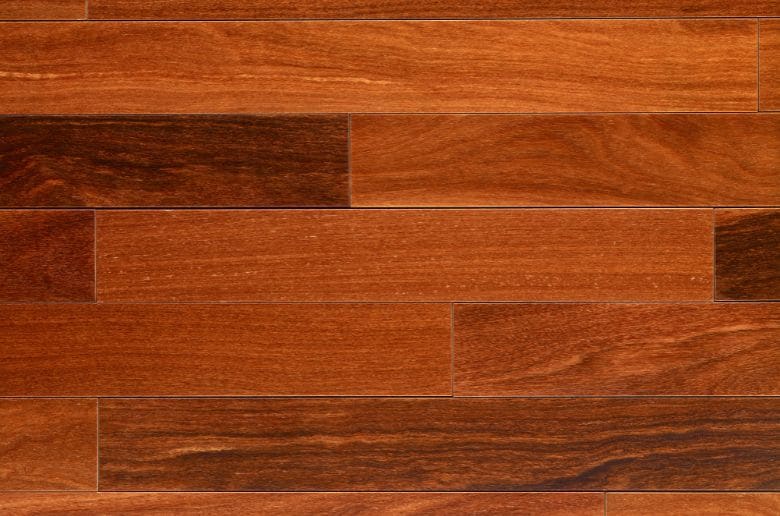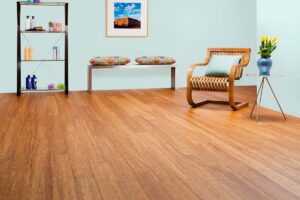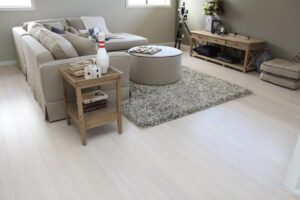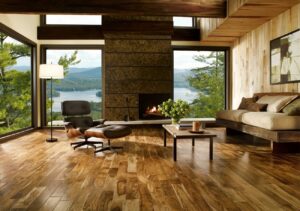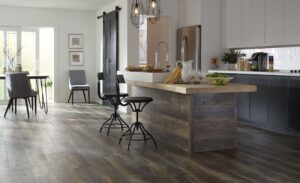Cumaru flooring wood’s rise in popularity is hard to ignore for those exploring durable flooring options.
Its exceptional Janka hardness rating of 3450 points to a resilience that assures homeowners of its long-standing performance underfoot.
We must consider how Cumaru flooring integrates with modern home aesthetics, offering a harmonious blend of strength and style.
Before deciding on Cumaru, we must weigh its rich hues and longevity against its initial installation complexities.
Each choice in flooring material comes with its unique set of considerations, and Cumaru is no exception, promising robustness for high-traffic areas while demanding careful contemplation of its properties.
Pros of Cumaru Flooring
Cumaru flooring stands as a testament to both aesthetic appeal and practical durability in modern home design.
Exceptional Durability and Resistance to Wear
Cumaru, with its impressive Janka rating, offers a resistance to wear that sets it apart. This hardwood can endure the rigors of daily foot traffic, resisting dents and scratches that softer woods cannot.
- Durability: Outlasts many flooring materials due to dense grain structure.
- Resistance: Withstands heavy furniture and high-traffic scenarios.
Natural Weather Resistance for Indoor and Outdoor Use
The remarkable weather-resistant properties of Cumaru make it a versatile option for both indoor and outdoor environments.
- Indoor: Maintains integrity away from sunlight and moisture.
- Outdoor: Resists the elements, making it ideal for decks and patios.
Note: Cumaru’s natural oils contribute to its weather-resistant qualities.
Enhanced Insulation for Energy-Efficient Homes
Installing Cumaru contributes to better insulation, which can lead to more efficient energy use in homes.
- Thermal Properties: Natural insulation against cold and heat.
- Energy Efficiency: Reduces the need for heating and cooling.
Sustainable and Eco-friendly Flooring Option
Cumaru is often harvested with sustainability in mind, making it an eco-friendly choice for the environmentally conscious homeowner.
- Sourcing: Certified sustainable options are available.
- Eco-friendly: Less environmental impact compared to other hardwoods.
Wide Availability and Variety in the Market
The increasing demand for Cumaru ensures its availability in a variety of styles and finishes, allowing for a wide range of design flexibility.
- Variety: Plank sizes and finishes to suit any design preference.
- Availability: Readily available through multiple suppliers.
Balance of Affordability and Longevity
Cumaru strikes a balance between cost-effectiveness and long-term value, due to its durability and longevity.
- Cost-Effectiveness: Competitive pricing compared to other hardwoods.
- Investment: Long lifespan ensures value over time.
The Aesthetic Appeal of Cumaru’s Rich Hue
The rich, reddish-brown tones of Cumaru wood add warmth and elegance to any space, enhancing the overall aesthetic of a home.
- Visual Appeal: Natural hues that complement various design schemes.
- Finish Options: Can be finished to accentuate its natural beauty or match decor.
Minimal Maintenance Requirements for Busy Lifestyles
Cumaru’s need for minimal maintenance makes it an ideal flooring for busy lifestyles.
- Cleaning: Simple routine cleaning is typically sufficient.
- Upkeep: No need for frequent sanding or refinishing.
Cumaru’s Longevity Over Decades
The longevity of Cumaru is notable, with proper care, this flooring can last for decades, making it a one-time investment for many homeowners.
- Lifespan: Can last a lifetime with proper maintenance.
- Wear Layer: Resilience contributes to a long-lasting surface.
Ideal for High-Traffic Areas: Durability Meets Design
For areas that see a lot of foot traffic, Cumaru’s durability ensures it remains beautiful and functional.
- High-Traffic Suitability: Resists the typical wear and tear.
- Design: Offers a luxurious look without compromising on durability.
Stability in Various Environmental Conditions
Cumaru’s stability in different environmental conditions means it experiences less expansion and contraction, which can lead to warping in lesser quality woods.
- Dimensional Stability: Less prone to changes with humidity and temperature.
- Adaptability: Suitable for a variety of climates and settings.
The collective attributes of Cumaru, from its robust nature to its eco-friendly benefits, make it a top contender for those seeking a fusion of resilience, beauty, and environmental consideration.
Each facet contributes to its standing as a premier choice for flooring that is both long-lasting and visually stunning.
Cons of Cumaru Flooring
While Cumaru flooring offers many benefits, there are considerations to weigh before making a decision.
The Challenge of Installation Due to Wood Density
Cumaru’s density, while a boon for durability, presents challenges during installation. This hardwood requires specialized tools and techniques, often leading to extended labor time and increased cost.
- Specialized Tools: Necessary for cutting and installing due to wood hardness.
- Labor Intensive: Installation can take longer than softer woods.
Scarcity of Unfinished Cumaru Wood Options
For those who prefer a custom finish, Cumaru may not be the ideal choice. The availability of unfinished Cumaru is limited, which can be a drawback for some projects.
- Limited Customization: Fewer options for those desiring a specific finish.
- Availability: Not as widely available as prefinished options.
Higher Installation Costs Compared to Other Woods
The labor-intensive nature of Cumaru installation often results in higher costs. It’s important to budget accordingly for both material and labor expenses.
- Labor Costs: Typically higher due to the wood’s hardness.
- Total Expense: Installation costs can add significantly to the overall budget.
Potential for Gapping in Fluctuating Humidity
While Cumaru is stable, it’s not immune to the effects of humidity. In climates with significant humidity fluctuations, gapping can occur as the wood expands and contracts.
- Climate Sensitivity: Gaps may appear with changes in humidity.
- Preventive Measures: Additional costs for humidity control might be necessary.
Finishing Limitations Due to Natural Oils
The same natural oils that give Cumaru its weather-resistant qualities can also inhibit the adherence of certain finishes, limiting finishing options.
- Finish Adherence: Some finishes may not bond well due to the wood’s oils.
- Preparation: Extra steps may be required to ensure finish adheres properly.
Higher Cost Relative to Other Hardwood Flooring
Cumaru’s many advantages come with a price tag that may be higher than other hardwood options, which is an important factor for budget-conscious individuals.
- Material Cost: Generally higher than many other hardwoods.
- Investment: Should be viewed as a long-term investment due to cost.
Color and Grain Variations May Affect Consistency
Natural variations in color and grain can result in inconsistencies that are less predictable than engineered flooring options.
- Aesthetic Variability: Each board can vary, affecting overall uniformity.
- Selection: Careful selection and placement of planks can mitigate this issue.
Susceptibility to Fading from Sunlight Exposure
Cumaru can fade when exposed to direct sunlight over time, which may be a concern in rooms with ample natural light.
- Sunlight Exposure: Can cause the wood to lose some of its vibrant color.
- UV Protection: Window treatments or UV protective finishes may be necessary.
Considerations for Handling Heavy Wood Material
The weight of Cumaru can be a factor in both shipping and handling during installation, potentially adding to the labor required.
- Weight: Cumaru’s density makes it a heavy material to work with.
- Handling: May require more installers or specialized equipment.
Climate-Induced Expansion and Contraction
Like all woods, Cumaru reacts to climatic conditions. This natural response can result in expansion and contraction, which may affect long-term stability and appearance.
- Environmental Response: Minor changes in the wood’s dimensions can occur.
- Installation Technique: Requires expertise to allow for natural wood movement.
Note: Professional installation is strongly recommended to address these challenges effectively.
Understanding these potential drawbacks is crucial for homeowners to ensure that the choice of Cumaru flooring aligns with their lifestyle, preferences, and practical requirements.
Each factor should be carefully considered to fully appreciate the implications of selecting this robust yet demanding hardwood for one’s home.
Conclusion
Cumaru flooring boasts exceptional durability and a host of benefits suitable for various settings, yet it comes with its own set of challenges.
A thorough analysis of long-term advantages against the upfront costs will guide informed decisions. Assessing individual needs and preferences is essential to determine if Cumaru’s qualities align with one’s expectations.
Our final recommendation is to consult with a flooring expert to evaluate if Cumaru flooring will be a valuable addition to your space, ensuring that it meets both aesthetic desires and practical demands.
